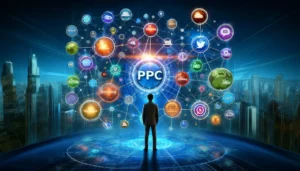Maximising Your Returns: The Best PPC Tools for Ultimate ROI

In the dynamic world of digital advertising, mastering pay-per-click (PPC) campaigns is essential for businesses aiming to maximise their return on investment (ROI). This article explores the best PPC tools and strategies designed to enhance campaign performance and ROI. From strategic bid management and data analytics to the integration of SEO and PPC, we’ll provide insights on optimising your digital marketing efforts for ultimate financial returns.
Key Best PPC Tools Takeaways
- Advanced bidding strategies and A/B testing are crucial for fine-tuning PPC campaigns to improve ROI.
- Effective use of analytics and conversion tracking enables data-driven decisions that optimise PPC performance.
- Integrating SEO insights with PPC data can lead to synergistic growth and higher conversion rates.
- Utilising top PPC management tools and technologies can streamline agency processes and enhance campaign outcomes.
- Expanding PPC reach with complementary digital marketing services can significantly boost overall campaign results and profitability.
Strategic Bid Management for Enhanced PPC Performance
Understanding Advanced Bidding Strategies
To truly excel in PPC, you must grasp the intricacies of advanced bidding strategies. Smart Bidding, a feature of Google Ads, harnesses the power of AI to optimise your bids in real-time, considering signals like device, location, and time of day. This approach is particularly effective when your focus is on conversion optimisation.
By aligning your bidding strategy with your campaign goals, you can significantly enhance your campaign’s performance. Whether you’re aiming to maximise conversions or the total value of those conversions, Smart Bidding can adjust your bids for each auction, ensuring you’re not just competitive, but precise.
Here’s how you can leverage Maximise Conversions and Maximise Conversions Value bidding:
- Maximise Conversions: Analyses past performance and real-time signals to adjust bids dynamically, aiming to secure cost-effective conversions within your budget.
- Maximise Conversions Value: Focuses on maximising the total value of conversions, like sales revenue or profit margins, by optimising bids for each auction based on real-time and historical data.
Remember, while these strategies aim to fully utilise your daily budget for maximum conversions, they also come with limitations. It’s crucial to understand these to tailor your approach effectively. For instance, Maximise Conversions bidding quickly adapts to search behavior and competition, which can be a double-edged sword if not monitored closely.
Leveraging A/B Testing for Optimal Bid Adjustments
When you’re fine-tuning your PPC campaigns, A/B testing is your secret weapon. By systematically comparing different bidding strategies, you can discern precisely which adjustments lead to better performance. Start by altering one variable at a time—be it device type, location, or time of day—to isolate the impact of each factor on your ad’s success.
Use bid adjustments to your advantage. They are not just tweaks; they’re strategic tools that can significantly enhance your campaign’s ROI. For instance, if you discover that your coffee shop ads perform exceptionally well on weekday mornings, increase your bids during those hours to capitalise on high-intent traffic.
Maximise Conversions bidding is another potent approach. It leverages AI to adjust bids in real-time, aiming to secure the most cost-effective conversions within your budget. However, remember to weigh its advantages against any limitations, ensuring it aligns with your campaign goals.
To truly master A/B testing, maintain a structured approach. Document each test meticulously, noting down hypotheses, outcomes, and subsequent strategy adjustments. This will build a valuable knowledge base for future campaigns.
Finally, here’s a quick reference to keep in mind:
- Identify key variables for testing
- Implement bid adjustments based on performance data
- Evaluate the effectiveness of Maximise Conversions bidding
- Document and learn from each A/B test
Best PPC Tools: Utilising Predictive Analytics for Smarter Bidding
Harness the power of predictive analytics to elevate your PPC campaigns. By integrating predictive analytics, you’re not just reacting to market trends, you’re anticipating them. Smart Bidding strategies, such as Maximise Conversions and Maximise Conversion Value, leverage Google’s AI to analyse real-time signals and historical data, ensuring your bids are as effective as possible.
With predictive analytics, bid adjustments are no longer guesswork. They become strategic decisions based on data-driven forecasts, leading to more efficient use of your advertising budget.
Consider Enhanced CPC (eCPC) bidding, which strikes a balance between manual oversight and automated efficiency. It adapts bids for higher value conversions, prioritising clicks with a greater likelihood of conversion. Here’s how eCPC compares to fully automated strategies:
- Enhanced CPC (eCPC): Offers manual control with automated bid adjustments for high-value clicks.
- Fully Automated Smart Bidding: Focuses on optimising for conversions or conversion value, with less manual intervention.
Remember, predictive analytics is not just about the technology; it’s about using that technology to make informed, strategic decisions that align with your campaign goals. By doing so, you can ensure that every dollar spent is an investment towards higher returns.
Leveraging Analytics for PPC Campaign Optimisation
Key Metrics to Monitor for Performance Analysis
To truly maximise your returns, you must keep a vigilant eye on the pulse of your PPC campaigns. Key metrics such as Click-Through Rate (CTR), Conversion Rate, Cost Per Click (CPC), and Return on Ad Spend (ROAS) are the cornerstones of performance analysis. These indicators not only reflect the health of your campaigns but also guide your strategic decisions.
Google ads audit is an essential practice that can reveal insights into these metrics, helping you understand the efficacy of your ads and where to allocate your budget for the best ROI. Here’s a simple breakdown to get you started:
- CTR: Measures the percentage of people who click on your ad after seeing it. A low CTR may indicate that your ad is not resonating with your target audience.
- Conversion Rate: Indicates the percentage of clicks that result in a conversion. This metric helps you understand how compelling your ad is in driving the desired action.
- CPC: Reflects the cost for each click on your ad. Monitoring CPC helps manage your budget and understand the competitiveness of your keywords.
- ROAS: Represents the revenue generated for every dollar spent on advertising. It’s a direct measure of the profitability of your PPC campaigns.
By regularly conducting a thorough Google ads audit, you can pinpoint areas for improvement and ensure that your campaigns are optimised for peak performance.
Remember, the goal is to make data-driven decisions that lead to tangible improvements in your PPC strategy. Regularly reviewing these metrics will provide you with the actionable insights needed to refine your approach and achieve a higher ROI.
The Role of Conversion Tracking in ROI Improvement (Best PPC Tools)
Best PPC Tools: to truly maximise your ROI, you must embrace the power of conversion tracking. Assigning accurate values to the conversions you track is not just about measuring success—it’s about understanding the financial impact of each click and optimising your campaigns accordingly. By leveraging tools like Google Analytics and Facebook Pixel, you can dive deep into metrics such as conversion rate, click-through rate, and cost per acquisition.
With a clear view of these metrics, you’re equipped to refine your targeting strategies and enhance your campaign’s performance.
Remember, it’s not just about the volume of conversions, but the quality and value they bring. Here’s a simple breakdown to help you focus on what matters:
- Conversion Rate: Indicates the effectiveness of your ad in generating leads or sales.
- Click-Through Rate (CTR): Reflects user engagement with your ad.
- Cost Per Acquisition (CPA): Measures the cost-effectiveness of your campaign.
- Return on Investment (ROI): The ultimate indicator of your campaign’s profitability.
By analysing these metrics, you can identify areas for improvement and make data-driven decisions that boost your ROI. It’s a transparent process that ensures you’re never in the dark about the performance of your investments.
Making Data-Driven Decisions with Performance Analytics
In the realm of PPC, your ability to make informed decisions hinges on the effective use of performance analytics. Data is your compass, guiding each campaign towards success. By meticulously analysing key performance indicators (KPIs), you can pinpoint areas of strength and those in need of improvement.
Consider the following KPIs as your navigational stars:
- Click-Through Rate (CTR)
- Conversion Rate
- Cost Per Conversion
- Return on Ad Spend (ROAS)
Each metric offers a unique lens through which to view your campaign’s efficacy. For instance, a low CTR might indicate a need for more compelling ad copy or better keyword targeting. Conversely, a high Cost Per Conversion could suggest that while your ads are effective at generating interest, there’s a disconnect in the conversion funnel.
Embrace the power of visual analytics. Dashboards and charts not only simplify complex data but also illuminate the path forward with clear, actionable insights.
Remember, the goal is not just to collect data, but to transform it into actionable strategies that drive ROI. Leverage tools that offer predictive analytics to forecast future trends and prepare your campaigns to capitalise on them. By doing so, you’re not just reacting to the market—you’re staying one step ahead.
Integrating SEO and PPC for Synergistic Growth
Harnessing Keyword Insights for Cross-Channel Success
To truly maximise your ROI, you must become adept at interpreting the wealth of data that keywords provide across both SEO and PPC channels. High-intent keyword selection is pivotal in driving conversions, and by analysing which keywords perform best in your PPC campaigns, you can refine your SEO efforts to mirror this success. This cross-pollination of insights ensures that you’re not only targeting the right audience but also speaking their language across all digital touchpoints.
- Use Advertising Research reports to pinpoint competitor keyword shifts and glean strategic insights.
- Examine the Ads History to track keyword performance over time, adapting to trends and seasonal changes.
By integrating these keyword insights, you create a cohesive narrative that resonates with your audience, regardless of the channel they find you on. Remember, it’s not just about the volume of keywords, but their relevance and conversion potential that will set you apart in a crowded digital landscape.
By leveraging keyword analytics from your PPC campaigns to inform your SEO strategy, you’re not just optimising for search engines; you’re optimising for growth and profitability.
Aligning SEO Content Strategy with PPC Data
To truly excel in digital marketing, you must recognise the symbiotic relationship between SEO and PPC. Aligning your SEO content strategy with PPC data is not just a best practice; it’s a strategic imperative that can significantly amplify your online presence. By analysing the performance of your PPC campaigns, you can uncover valuable insights into which keywords and ad types resonate most with your audience. This information is a goldmine for tailoring your SEO efforts to match the proven preferences of your target market.
When you integrate PPC data into your SEO strategy, you’re not just guessing what content will perform well; you’re making informed decisions based on actual user engagement and conversion data.
Consider the following steps to ensure a seamless integration:
- Review PPC campaign analytics to identify high-performing keywords and ad copy.
- Incorporate these findings into your SEO content creation, focusing on themes that have demonstrated success.
- Regularly update your content strategy based on ongoing PPC data analysis to stay ahead of market trends and user behaviour.
Remember, the goal is to create a cohesive digital marketing strategy where SEO and PPC complement each other, leading to a more targeted approach and increased conversion rates. By doing so, you’ll not only maximise your ROI but also build a stronger, more consistent brand narrative across all channels.
Best PPC Tools: Maximising ROI Across SEO and PPC Channels
To truly maximise your ROI, you need to see SEO and PPC not as rivals, but as partners in your digital marketing strategy. By harmonising your SEO and PPC efforts, you can create a powerful synergy that amplifies your online presence and drives revenue growth. For instance, when you identify which keywords and ad types yield the best results in PPC, you can tailor your SEO strategy to echo these themes, enhancing your content’s relevance and visibility.
By leveraging the strengths of both SEO and PPC, you can cover all bases – securing long-term brand authority with SEO while achieving immediate visibility with PPC.
Remember, the goal is omnichannel marketing; maintaining a cohesive brand presence across multiple channels. Here’s how you can integrate SEO and PPC for maximum impact:
- Analyse the ROI of both channels to inform budget allocation.
- Use SEO data to refine PPC ad copy and targeting for higher conversion rates.
- Employ PPC to test and validate SEO strategies quickly, adapting to market changes.
Is it cost-effective to invest in both? Absolutely. This dual approach not only builds a robust digital presence but can also be more cost-effective in the long run. Each strategy supports and enhances the other, leading to a cumulative increase in leads and revenue.
Essential Best PPC Tools for Success
Top Tools for Streamlining PPC Management
In the realm of PPC management, the right tools are your secret weapon for efficiency and effectiveness. Automating routine tasks is a game-changer, freeing up your time to focus on strategy and client relationships. Consider tools that offer comprehensive features, from bid adjustments to keyword research, ensuring a thorough PPC audit and ongoing optimisation.
- Google Ads Editor: For bulk editing and offline management.
- SEMrush: Offers competitive intelligence and keyword insights.
- WordStream: Simplifies workflow with smart recommendations.
Embrace tools that not only streamline operations but also provide actionable insights. This dual benefit is crucial for staying ahead in a competitive landscape.
Remember, the best tools are those that align with your agency’s specific needs and integrate seamlessly into your existing processes. Evaluate each tool’s capabilities against your goals to ensure it enhances, rather than complicates, your PPC management.
Innovative Technologies for Campaign Automation
Best PPC Tools: in the realm of PPC, automation is your silent powerhouse, working tirelessly to optimise your campaigns while you focus on the bigger picture. Automation creates systematic processes that eliminate repetitive tasks, freeing up your time to engage in strategic planning and creative endeavours. With tools like Google’s latest offerings, announced at Google Marketing Live 2023, you’re equipped to deliver better ad experiences and understand the driving forces behind your campaign’s success.
Optimisation and tracking technologies have revolutionised the way we approach PPC advertising. By harnessing these tools, you can build smarter, targeted campaigns that are not only measurable but also highly efficient. Consider the following benefits of campaign automation:
- Systematic elimination of redundancies
- Enhanced targeting for maximum relevance
- Continuous learning and adaptation for campaign improvement
Embrace the power of automation to transform your PPC management efficiency. Let the technology handle the heavy lifting, while you channel your human creativity into scaling your business and driving revenue.
Remember, mastering automation doesn’t mean setting your campaigns on autopilot. It’s about integrating advanced targeting techniques and continuous adaptation to ensure your ads reach the most relevant audience. By doing so, you’ll not only improve campaign efficiency but also create a more engaging user experience.
Enhancing Agency Services with PPC Tool Integration
As a PPC agency, integrating advanced tools into your services can be a game-changer. Boldly embrace technology to elevate your agency’s offerings and distinguish yourself from the competition. For instance, a London PPC agency might leverage tools that provide granular data insights, enabling them to tailor strategies to the unique dynamics of the local market.
By integrating PPC tools, agencies can automate routine tasks, freeing up time for strategic thinking and creative endeavors. This shift towards higher-value activities can significantly enhance client satisfaction and retention.
Consider the following benefits of PPC tool integration for agencies:
- Streamlined campaign management
- Enhanced reporting capabilities
- Improved client communication
- Greater scalability for growing client lists
Whether you’re a Google ads agency or a specialised PPC eCommerce agency, the right tools can transform your operations. Google advertising agencies, in particular, can benefit from tools that sync seamlessly with Google’s ecosystem, providing a competitive edge. Remember, the goal is not just to manage campaigns but to drive growth and maximise ROI for your clients.
Expanding Your PPC Reach with Digital Marketing Services
Complementary Services to Boost PPC Results
To truly maximise your Google Ads PPC, Google Adwords PPC, and eCommerce ppc efforts, consider integrating complementary digital marketing services. These services not only enhance your PPC campaigns but also create a cohesive online presence that can significantly boost your ROI.
Diversifying your strategy with additional services such as SEO, email marketing, and social media advertising can lead to a more robust digital footprint. Each channel supports the others, creating a synergistic effect that amplifies your brand’s reach and conversion potential.
By thoughtfully combining these services, you’re not just casting a wider net—you’re weaving a stronger one.
Consider the following enhancements to your PPC strategy:
- SEO optimisation to improve organic search visibility
- Email marketing campaigns for nurturing leads
- Social media ads for brand awareness and engagement
- Content marketing to establish thought leadership
Remember, the key to a successful digital marketing strategy is not just to increase traffic, but to attract the right kind of traffic that will convert and contribute to your business growth.
Developing High-Converting Landing Pages
Your landing page is the pivotal touchpoint where potential customers decide whether to engage further with your brand or bounce away. Optimising your landing pages is not just a best practice; it’s a necessity. Start by ensuring that the design resonates with your target audience, using visuals and messaging that align with their expectations and needs.
Persuasive copywriting is your ally in converting visitors into leads. Address the pain points of your audience and articulate the value proposition clearly. Your call-to-action (CTA) should be unambiguous, compelling visitors to take the next step with confidence. Remember, every element on the page should work towards the goal of conversion.
Mobile optimisation is no longer optional. With the majority of web traffic coming from mobile devices, your landing pages must perform flawlessly across all screens.
To truly maximise your landing page efficacy, embrace A/B testing. This iterative process allows you to refine elements based on real user data, ensuring that your landing page evolves into the most effective version of itself. Here’s a quick checklist to keep you on track:
- Visual appeal and user-friendly design
- Clear and persuasive headlines and copy
- Strong, visible CTA buttons
- Trust elements like badges and testimonials
- Urgency triggers such as limited-time offers
- Mobile responsiveness
- Regular A/B testing for continuous improvement
Maximising Growth with Targeted Digital Strategies
Best PPC Tools: to truly maximise growth, you must embrace a holistic approach that extends beyond traditional PPC. Advanced targeting strategies are pivotal, allowing you to pinpoint your ideal audience with demographic, geographic, and psychographic data. This precision not only boosts campaign effectiveness but also elevates ROI.
Advanced targeting techniques ensure your ads resonate with the most relevant audience, enhancing user experience and campaign efficiency. Remember, the goal is to make every ad count by reaching those most likely to convert.
By diversifying your traffic sources and optimising operations, you’re not just chasing immediate results; you’re building a sustainable model for growth.
Here’s a quick checklist to ensure you’re covering all bases:
- Identify Audience Channels to effectively allocate resources.
- Utilise SEO Strategies to attract relevant traffic organically.
- Embrace PPC Advertising for targeted keyword and demographic reach.
- Harness Social Media Platforms to engage and drive traffic.
Continuous learning and adaptation are essential. Monitor performance metrics diligently and remain agile, ready to pivot your strategies in response to market dynamics. This approach will help you sustain growth and maximise ROI over the long term.
Conclusion for the Best PPC Tools
As we’ve explored throughout this article, the right PPC tools are indispensable for maximising your ROI in the digital marketing landscape. From advanced bidding strategies to optimisation and tracking technologies, these tools empower you to build smarter, targeted, and measurable campaigns. By leveraging the insights and capabilities they offer, you can enhance your PPC performance, avoid common pitfalls, and capitalise on growth opportunities. Remember, the key to PPC success lies not just in the tools you use, but in how you use them to understand user intent, refine your strategies, and make data-driven decisions. Embrace the ever-changing PPC terrain with confidence, knowing that these tools are your allies in achieving ultimate ROI.
Frequently Asked Questions on the Best PPC Tools
How can advanced bidding strategies improve PPC performance?
Advanced bidding strategies enable advertisers to maximise their ROI by using sophisticated algorithms and machine learning to adjust bids in real-time based on various factors like device, location, and time of day, ensuring the most cost-effective ad placements.
What is the importance of A/B testing in PPC campaigns?
A/B testing allows advertisers to compare different versions of their ads or landing pages to determine which one performs better. This data-driven approach leads to optimised bid adjustments and improved campaign performance.
How does predictive analytics contribute to smarter bidding in PPC?
Predictive analytics uses historical data and machine learning to forecast future trends and behaviours. In PPC, this helps advertisers anticipate the best bidding opportunities, reduce waste, and allocate budgets more effectively.
Why is conversion tracking critical for PPC ROI improvement?
Conversion tracking measures the effectiveness of PPC campaigns by tracking actions like purchases or sign-ups. This information is crucial for understanding which ads drive conversions and for calculating the actual ROI of campaigns.
How can integrating SEO and PPC lead to synergistic growth?
By analysing which keywords and ad types perform best in PPC, companies can refine their SEO strategy to focus on similar themes. Conversely, high-performing SEO content can inform PPC ad copy, leading to more targeted campaigns and higher conversion rates.
What are the benefits of using PPC tools for agency success?
PPC tools streamline management, automate campaign tasks, and integrate various services to enhance performance. They provide agencies with the capabilities to manage campaigns more efficiently and scale their services, leading to greater client satisfaction and business growth.
Author
Search Blog
Free PPC Audit
Subscribe to our Newsletter
The Voices of Our Success: Your Words, Our Pride
Don't just take our word for it. With over 100+ five-star reviews, we let our work-and our satisfied clients-speak for us.
"We have been working with PPC Geeks for around 6 months and have found Mark and the team to be very impressive. Having worked with a few companies in this and similar sectors, I rate PPC Geeks as the strongest I have come across. They have taken time to understand our business, our market and competitors and supported us to devise a strategy to generate business. I value the expertise Mark and his team provide and trust them to make the best recommendations for the long-term."
~ Just Go, Alasdair Anderson




